The best Surf Spots along France’s South West Coast
The wild Atlantic coast of south-west France has some world-class surfing spots. From the barreling beach breaks of Hossegor and Capbreton in Landes to the point breaks of the Basque Country. Whether you’re a shortboarder, longboarder, total beginner or seasoned pro, there’s a break along this stretch of coast that is sure to hit the spot.
Surfing in France is much more of a mainstream sport than it is in the rest of Europe. Lineups at the famous spots are often packed with talented locals who dominate the peak. But this being beach break territory, with a little effort you can still find an uncrowded wave.
Surfers in south-west France are spoilt for choice when it comes to surf spots. Whether you prefer rights or lefts, steep and powerful waves or more mellow longboard-style waves, you’re sure to find a surf spot that suits. Our guide covers the best spots from Gironde to the Basque Country.
Surfing in Gironde
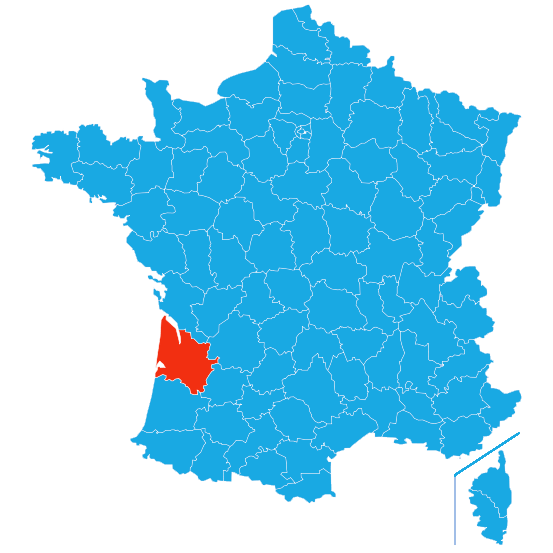
Stretching 120 km from Verdon-sur-Mer on the northern tip of the Médoc peninsula south to the Pointe d’Arcachon, Gironde’s coastline is ruler straight and has some superb beachbreak surfing. Home to Aquitaine’s capital, Bordeaux, breaks in southern Gironde like Lacanau and Cap Ferret can get busy, but walk up the beach a bit or strike out through the forest and you can find some solo surfing gems.
Surfing in Lacanau Océan
Spot type: Beachbreak.
Offshore wind: Easterly.
Bottom type: Sand.
Best tide: All.
Wave size: 0.3 to 3.0 m.
Lat Long: 45.002769, -1.201470.
Nearest town: Lacanau.
Lacanau is a bustling beach town renowned for its consistent surf. From La Nord to Super Sud, you can find a spot that will be working in any tide. Lacanau hosts the Lacanau Pro, one of the most prestigious surf competitions on the French leg of the World Surf League’s qualifying series. Lacanau’s quality surf and proximity to Bordeaux means it can get busy during weekends and holidays.
Surfing in Cap Ferret
Spot type: Beachbreak.
Offshore wind: Easterly.
Bottom type: Sand.
Best tide: All.
Wave size: 0.3 to 2.4 m.
Lat Long: 44.715072, -1.250235.
Nearest town: Lège-Cap-Ferret.
As you drive down the Cap Ferret peninsula you’ll hit Le Truc Vert, followed by l’Horizon and La Pointe. Constantly shifting sandbanks mean you’ll have to scout the best spot on the day from the dunes. Waves are typically fast and hollow and the Aquitaine baïne results in strong rips and currents. Autumn is best as the surf can be inconsistent in summer and too big in winter.
Surfing at Pointe d’Arcachon – La Salie
Spot type: Beachbreak.
Offshore wind: Easterly.
Bottom type: Sand.
Best tide: All except high.
Wave size: 0.3 to 2.4 m.
Lat Long: 44.529053, -1.252291.
Nearest town: La Teste-de-Buch.
Where Gironde meets Landes, La Salie has a reputation for a consistent wave that can hold shape from 1 to 8 ft. The water’s not the cleanest though, and despite an improvement on a few years ago, you’ll want to avoid swallowing too much of it. Access La Salie by heading to the Dune du Pilat and following the road south towards Biscarrosse. The spot is signposted right just after Le Petit Nice.
Surfing at Bobby – La Limite
Spot type: Beachbreak.
Offshore wind: Easterly.
Bottom type: Sand.
Best tide: All except high.
Wave size: 0.3 to 2.5 m.
Lat Long: 44.483269, -1.250212.
Nearest town: La Teste-de-Buch.
Half way between La Salie and Biscarosse is an old secret spot known locally as Bobby. Well known these days, the 20 minute walk through the forest still keeps it pretty quiet. It’s a bit hit and miss, but when the sandbanks are playing ball and there’s an offshore wind to smooth out the lines, it’s a magical spot. To access, head south exactly 14 km from the Dune du Pilat roundabout towards Biscarrosse and hang a right towards the beach.
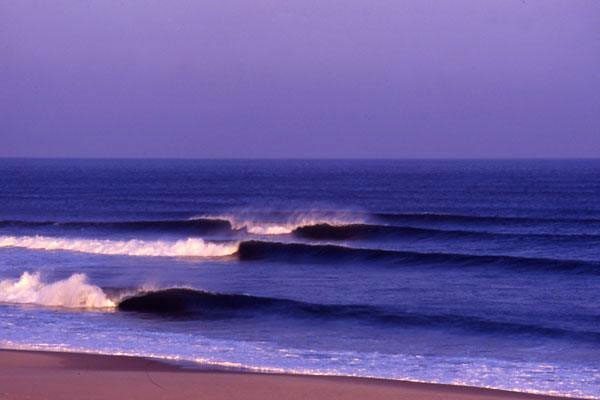
Surfing in Landes
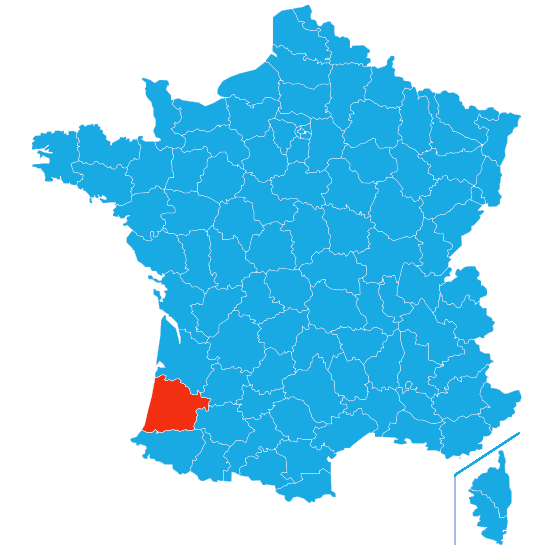
Landes in the Aquitaine region of southwestern France is home to some of the best beach-breaks in Europe. Add to that, water that can reach 22 degrees and freshly shaped sandbanks from the previous winter’s storms, and it’s little wonder that these are also some of the most crowded surf spots in France. But, surfers tend to stick to breaks nearest the coastal resort car parks and the long stretch of continuous beach means that with a bit of a walk you can be rewarded with an empty peak.
With more than 100 km of fine sandy beach that faces square on to the Atlantic, Landes takes the brunt of the Bay of Biscay swell. A deep submarine trench that dissects the ocean floor directly opposite Hossegor is responsible for southern Landes’ world-class barrels. Sandbanks shaped and reshaped by winter storms and strong spring tides jack up powerful peaks that in winter can reach up to 3 m.
Despite the long, straight sandy beach, each spot has its own characteristics and it’s possible to go from bone-crunching shorebreak to a beginner-friendly wave in just 500 m. Nowhere is this more the case than in Hossegor where the hollow barrels of La Gravière that draw crowds at the annual Quiksilver Pro France are just a short walk from mellow La Sud.
Surfing in Biscarosse Plage
Spot type: Beachbreak.
Offshore wind: Easterly.
Bottom type: Sand.
Best tide: Incoming.
Wave size: 0.3 to 2.5 m.
Lat Long: 44.449012, -1.255046.
Nearest town: Biscarrosse.
Biscarrosse is an excellent spot and marks the start of the more powerful surf that southwestern France is known for. In an offshore wind it will frequently hold a fast barreling wave. On the downside, strong currents and shifting peaks makes it a hard paddle. Packed in the summer, it’s worthwhile walking north up the beach to seek out a quieter wave. South is a restricted military zone. From Bordeaux take the N10 south and follow signs to Arcachon then Biscarrosse.
Surfing in Mimizan-Plage
Spot type: Beachbreak.
Offshore wind: Easterly.
Bottom type: Sand.
Best tide: All.
Wave size: 0.5 to 2.5 m.
Lat Long: 44.449012, -1.255046.
Nearest town: Mimizan.
Nestled in the pine forest, Mimizan has a huge beach that spans four surf spots – La Garluche, Goëlands, Mouettes and Plage Sud. However, the fragrant pines do little to hide the unpleasant smell from the nearby paper factory when the wind’s blowing offshore and outflow from the Courant Mimizan means the water near the river mouth’s not the cleanest. Mimizan is famous for being the home break of 3x bodyboard champion, Nicolas Capdeville who now runs Mimizan Surf Academy.
Surfing in Lespecier
Spot type: Beachbreak.
Offshore wind: Easterly.
Bottom type: Sand.
Best tide: Mid.
Wave size: 0.3 to 2.4 m.
Lat Long: 44.164375, -1.305314.
Nearest town: Mimizan-Plage.
On its day Lespecier can hold a nicely shaped wave especially at mid-tide, but shifting sandbanks make it unpredictable. Lespecier is buried in the forest about 7 km south of Mimizan-Plage, so the spot is uncrowded even in summer, but strong currents combined with the isolation mean you’ll want to be paddle fit. To access, head to Bias and take the Route de Lespecier towards the beach passing au Rest’O and Les Pins d’Or on your way.
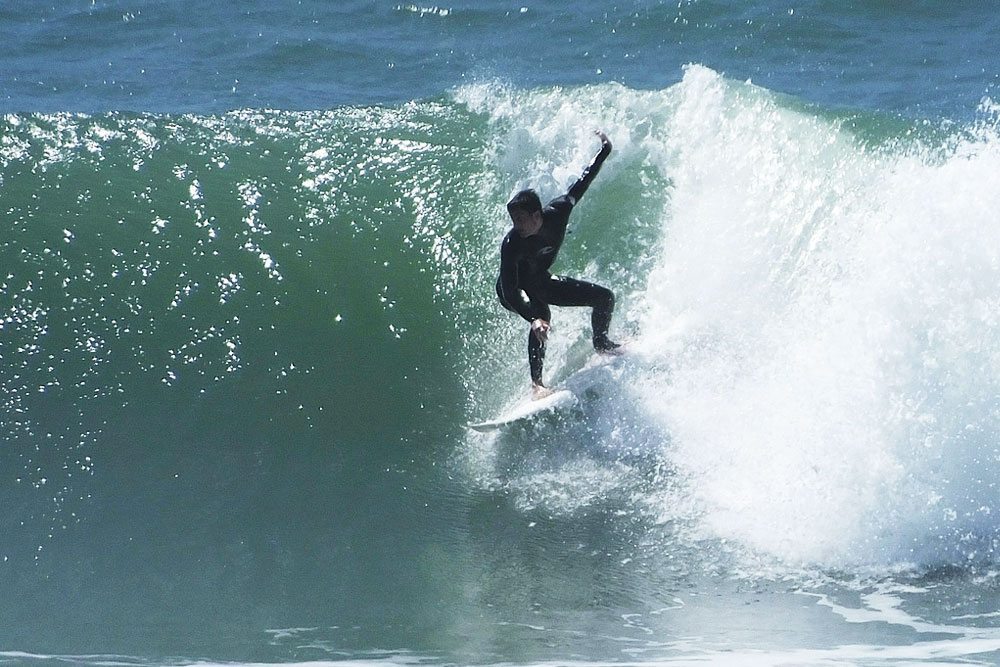
Surfing in Contis-les-Bains
Spot type: Beachbreak.
Offshore wind: Easterly.
Bottom type: Sand.
Best tide: All.
Wave size: 0.3 to 2.4 m.
Lat Long: 44.090968, -1.323570.
Nearest town: Saint-Julien-en-Born.
Contis-les-Bains is a laid-back summer resort about 25 minutes drive south of Mimizan. The surfing is classic Landes with shifting sandbars and multiple peaks. The best spots are either straight out in front of the bunker or just south of the river mouth. The estuary can disturb the sandbanks making it quite inconsistent and the water can turn brown after heavy rain. Access via Saint-Julien-en-Born.
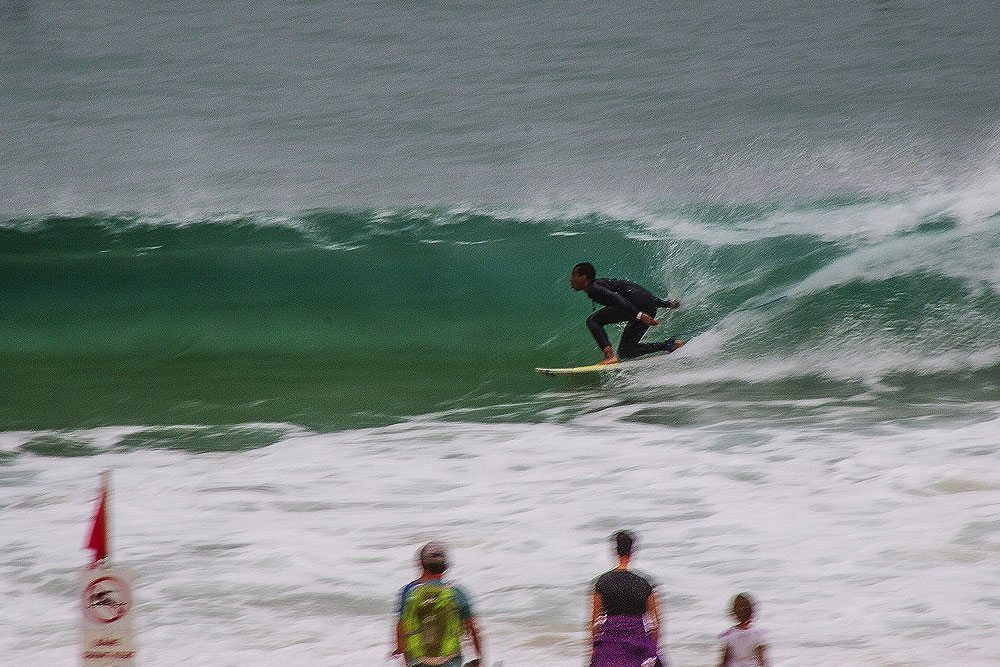
Surfing in Cap de l’Homy
Spot type: Beachbreak.
Offshore wind: North-easterly.
Bottom type: Sand.
Best tide: All.
Wave size: 0.3 to 2.4 m.
Lat Long: 44.038977, -1.340272.
Nearest town: Lit-et-Mixe.
Plage du Cap de l’Homy or Le Cap is a quiet spot on a huge beach near the town of Lit-et-Mixe. There’s nothing outstanding about the wave which is prone to close outs and the dominant onshore wind means it can be a challenge to get a good peak. However, if you hit it early in the day before the wind switches in the afternoon, you’ll have more chance of getting it good. Esprit Océan surf school rents boards and does lessons.
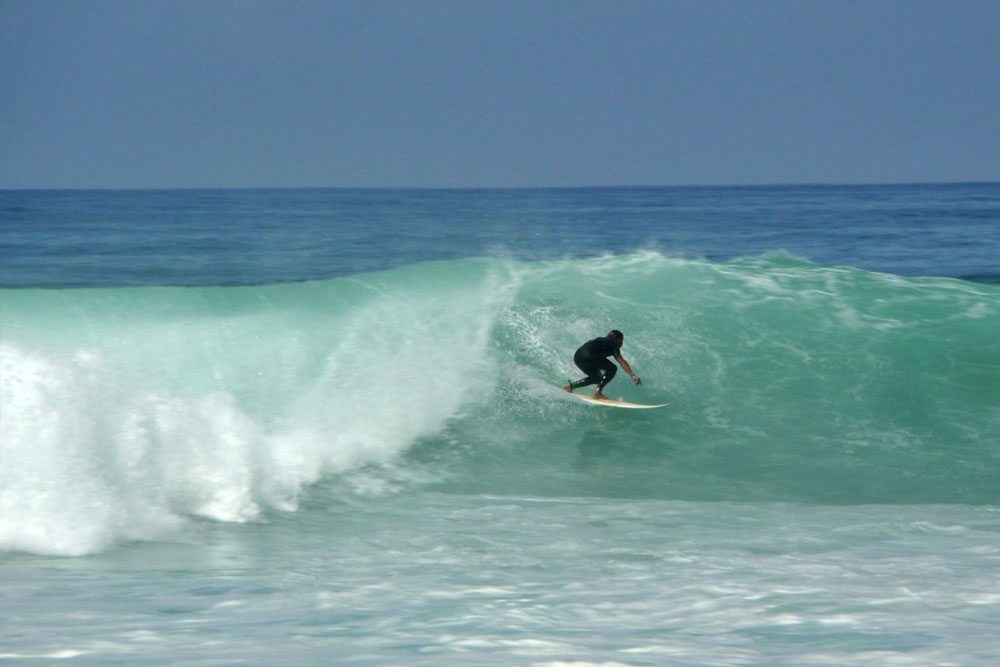
Surfing in Saint-Girons Plage
Spot type: Beachbreak.
Offshore wind: Easterly.
Bottom type: Sand.
Best tide: All.
Wave size: 0.3 to 2.4 m.
Lat Long: 43.952664, -1.363360.
Nearest town: Vielle-Saint-Girons.
Popular with international surfers trying to escape the summer masses, Saint-Girons is a typical southern Landes beachbreak that can dish out anything from steep, hollow barrels to mellow walls. Expect empty line ups except in summer when the spot plays host to the German Surf Masters. Access the beach from Vielle-Saint-Girons 5 km inland.
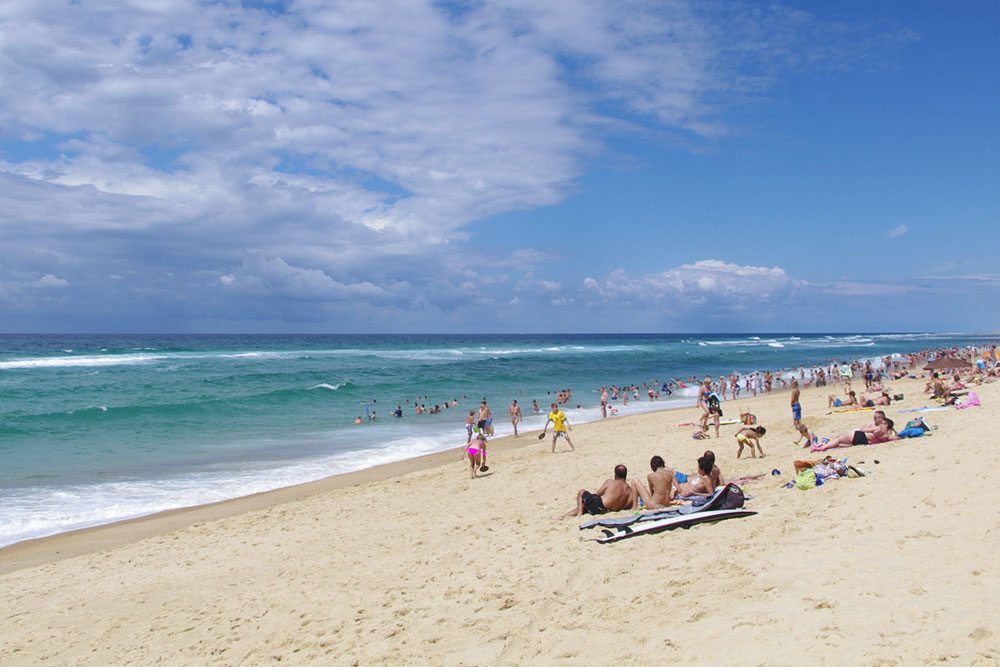
Surfing in Arnaoutchot – La Lette Blanche
Spot type: Beachbreak.
Offshore wind: E,SE.
Bottom type: Sand.
Best tide: All.
Wave size: 0.3 to 2.4 m.
Lat Long: 43.910964, -1.373256.
Nearest town: Vielle-Saint-Girons.
7 km south of Saint-Girons Plage, Arnaoutchot is another quiet surfing spot that throws up some nice left handers. It’s a popular nudist spot, which can be off-putting when you’re trying focus on nailing that next section. Strike out up or down the beach – there are peaks popping off all over. To access the spot, head south from Vielle-Saint-Girons and turn right down Route de Pichelèbe past the Arnaoutchot Natu Resort.
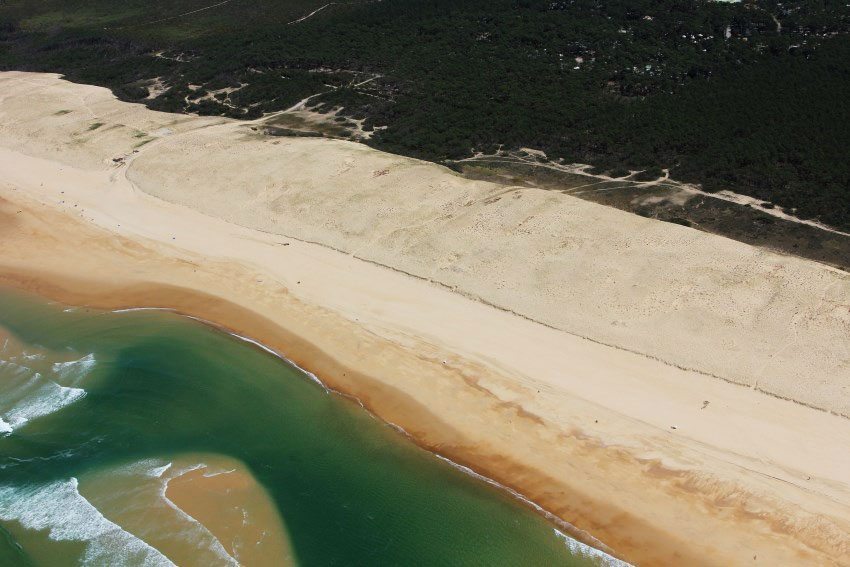
Surfing in Moliets Plage
Spot type: Beachbreak.
Offshore wind: E,SE.
Bottom type: Sand.
Best tide: All except high.
Wave size: 0.3 to 2.4 m.
Lat Long: 43.852360, -1.389910.
Nearest town: Moliets-et-Maa.
When the wind’s offshore and the sandbanks are working, Moliets can produce a nice open barreling wave. La Centrale gets super busy in summer and the banks tend to throw up closeouts. South of La Centrale, in front of the golf course, you’re more likely to find a classic south-Landes barrel. North near the river mouth can shape some nice rights. Moliets is popular with kitesurfers when blowing onshore.
Surfing in Messanges
Spot type: Beachbreak.
Offshore wind: E,SE.
Bottom type: Sand.
Best tide: All except high.
Wave size: 0.3 to 2.4 m.
Lat Long: 43.816020, -1.402829.
Nearest town: Messanges.
Nestled in the trees just 5 km south of Moliets is the surf village of Messanges. Walk north up the beach from the car park for a huge choice of beachbreak peaks including some nice A-frames when the banks are playing ball. There are more peaks further south at Messanges Sud. High tide isn’t usually any good. Camping de Moïsan is a good option if you want to camp. Lots of options for board hire and surf lessons.
Surfing in Vieux-Boucau
Spot type: Beachbreak.
Offshore wind: E,NE,SE.
Bottom type: Sand.
Best tide: All except high.
Wave size: 0.5 to 3.0 m.
Lat Long: 43.788146, -1.412160.
Nearest town: Vieux-Boucau.
Vieux-Boucau is a typical southern Landes spot with shifting sandbanks, strong currents and occasional heavy walls that can hold shape up to 3 m. Popular with holiday makers, the town isn’t very pretty and there’s loads of surf schools in the water in summer. Generally though, schools tend to stick to around 2 hours either side of high tide. Low tide is surfable and you can get fast hollow peaks on an incoming tide, but high tide will just dump on the sand.
Surfing in Seignosse
Spot type: Beachbreak.
Offshore wind: Easterly.
Bottom type: Sand.
Best tide: All.
Wave size: 0.5 to 3.5 m.
Lat Long: 43.697793, -1.436810.
Nearest town: Seignosse.
With Les Casernes, Le Penon, Les Bourdaines and Les Estagnots in its arsenal, Seignosse has some of the best beachbreaks on the planet. Winter storms batter the coast from January to April, redistributing the sandbars for the summer season ahead. Each break keeps its fundamental traits though; Le Penon entertains with its fun shorebreak, Les Bourdaines is a more shallow takeoff with peaks up and down the beach and Les Estagnots is a fast, hollow wave that can hold shape to well over head high.
Surfing in Hossegor
Spot type: Beachbreak.
Offshore wind: Easterly.
Bottom type: Sand.
Best tide: All.
Wave size: 1.0 to 4.5 m.
Lat Long: 43.662834, -1.442868.
Nearest town: Soorts-Hossegor.
Hossegor’s fast, hollow waves draw an ever growing number of surfers from around the world. Heavy shories make Hossegor a prime spot for competition surfing and each year the town plays host to the Quiksilver Pro France. Conditions vary hugely between breaks; South of Estagnots, Les Culs Nus bridges the gap between Seignosse’s beachbreaks and the legendary Hossegor tubes of La Gravière. On its day, La Nord, can hold shape up to 6 m. La Sud is the most beginner-friendly spot.
Surfing in Capbreton
Spot type: Beachbreak.
Offshore wind: E,SE.
Bottom type: Sand.
Best tide: All.
Wave size: 0.5 to 3.5 m.
Lat Long: 43.648296, -1.445036.
Nearest town: Capbreton.
Across the river mouth from Hossegor’s La Sud, you’re into Capbreton, which has both the most sheltered spot along the Côte Sauvage, Le Miramar in front of the Baya hotel, and the famous punchy barreling waves of La Piste. As you move south away from town the spots become progressively more exposed to bigger swell. Surf schools galore and popular with holiday makers and local rippers, the waves can get insanely crowded. Parking on Impasse de la Savane near the Capbreton Surf Club.
Surfing in Labenne-Océan – La Chapelle
Spot type: Beachbreak.
Offshore wind: E,NE,SE.
Bottom type: Sand.
Best tide: All.
Wave size: 0.5 to 3.0 m.
Lat Long: 43.606356, -1.466802.
Nearest town: Labenne.
Walk north up the beach from Labenne Océan’s central car park and you’ll reach a spot called La Chapelle opposite the Sainte-Thérèse church that sits up on a dune. A dominant offshore north-easterly in the mornings can sculpt come clean lines and on an incoming tide you can get some crazy barrels right near the shore. The spot is super exposed and becomes quickly blown out when the wind shifts. Strong currents mean you’ll need to be paddle fit to keep position.
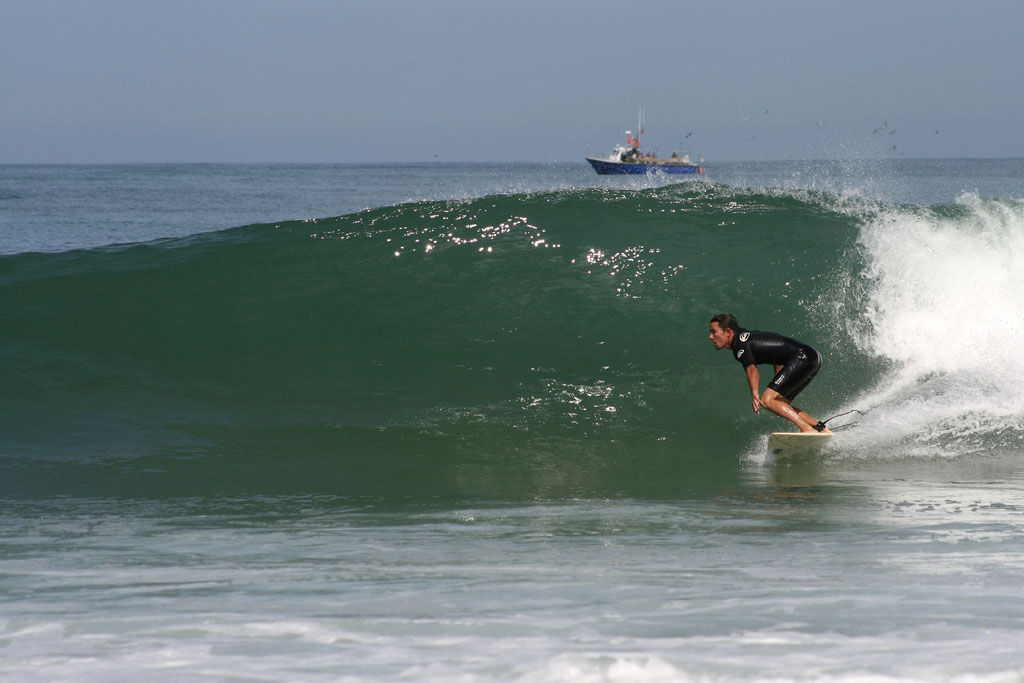
Surfing in Labenne-Océan – Casanova
Spot type: Beachbreak.
Offshore wind: Easterly.
Bottom type: Sand.
Best tide: All.
Wave size: 0.5 to 3.0 m.
Lat Long: 43.589759, -1.476315.
Nearest town: Labenne.
400 m south of central Labenne is Casanova, another typical south-Landes spot. Powerful shories and strong currents make this the domain of expert surfers. Constantly shifting sandbanks mean the peak is always moving, so it’s best to scout from the dunes before you paddle out. The spot works best on a mid-incoming tide. You can park your car on Promenade des Pyrénées.
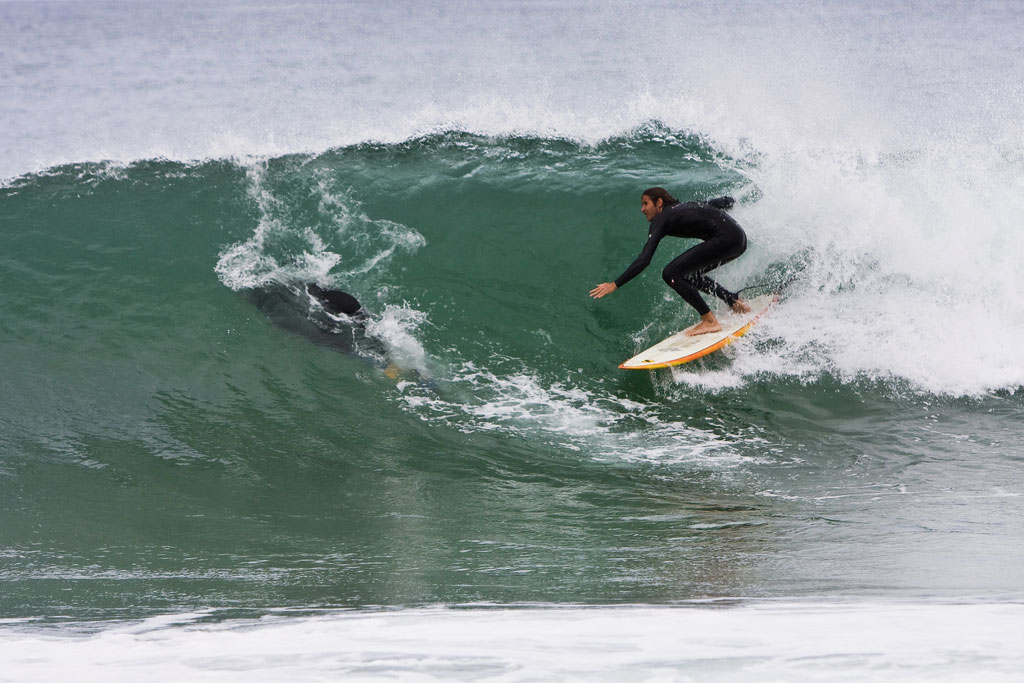
Surfing in Ondres-Plage
Spot type: Beachbreak.
Offshore wind: E,SE.
Bottom type: Sand.
Best tide: All.
Wave size: 0.5 to 3.0 m.
Lat Long: 43.576517, -1.485322.
Nearest town: Ondres.
The sandbar at Ondres kicks up a fast, hollow wave that starts working well from 1 m and can hold shape to over 3 m. An A-frame peak at Plage Centrale produces a short take-off and tuck-in right and left. The spot works best on a mid-incoming tide or 2 hours before low tide. Avoid high tide as shories just slam on the beach. Relatively few surfers except in the height of summer. Stay at Espace Blue Océan 1.8 km from the beach.
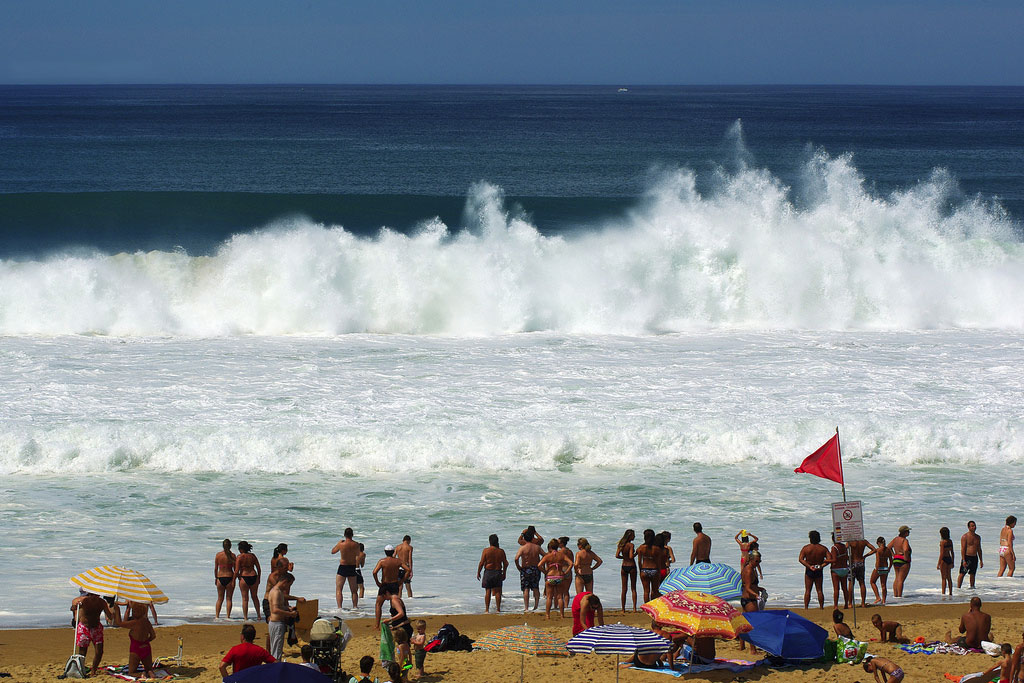
Surfing in Tarnos-le-Metro
Spot type: Beachbreak.
Offshore wind: E,SE,S,NE.
Bottom type: Sand.
Best tide: All.
Wave size: 0.5 to 3.0 m.
Lat Long: 43.557796, -1.498676.
Nearest town: Tarnos.
Tarnos produces a decent wave on an incoming tide when the sandbanks are cooperating. The groyne provides protection from southerly winds, so it can hold shape here when other spots are blown out. Strong currents and dubious water quality as a result of its proximity to the Adour river mouth further south. Tarnos itself is an unattractive town with some heavy industry slightly off the tourist trail.
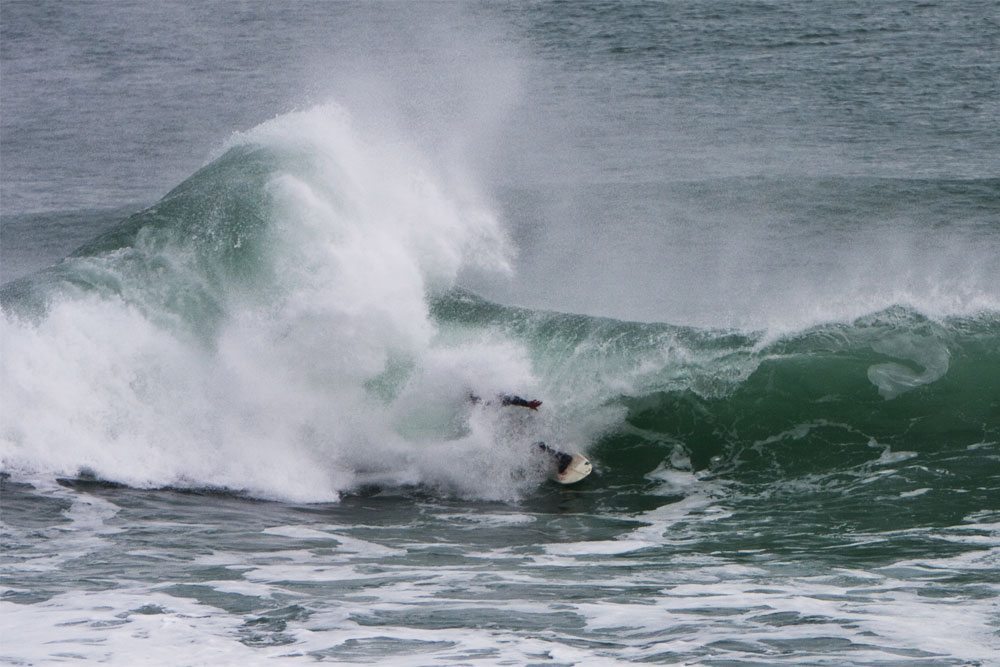
Surfing along the French Basque Coast
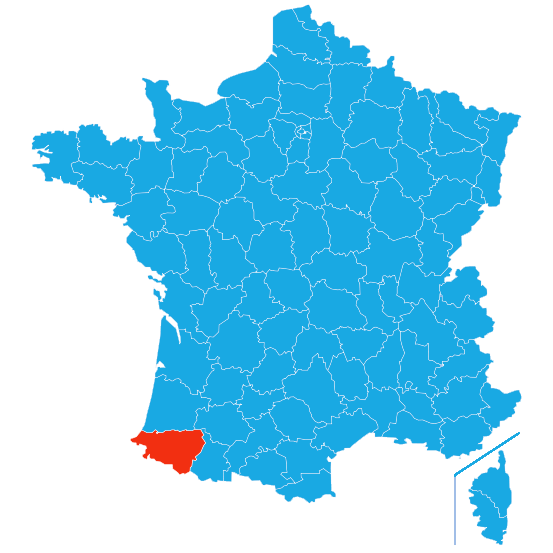
The French Basque Coast covers the 60 km of coastline from the Adour river mouth just north of Bayonne to the Rio Bidasoa that separates France and Spain just south of Hendaye. In stark contrast to the huge ruler-straight beaches that distinguish Landes and Gironde, the Basque Coast is peppered with rocky coves and headlands. The sandy bottom is interspersed with slabs of reef that trigger breaking waves when it’s too big on the beach, and it’s reefs like Belharra that are responsible for the big waves that the Côte Basque has become famous for.
Surfing in the Basque Country is all about variety; there’s a huge range of waves whether you’re a shortboarder, longboarder, total beginner or seasoned pro. From classic beach breaks to point breaks and reef breaks, you’ll be challenged and overjoyed in equal measure. The breakwaters in Anglet protect from cross-shore winds and clean up the surf, whilst big, powerful barreling waves roll in at Biarritz and Guéthary.
A late evening surf in the Basque Country with the sun setting and the Pyrenees silhouetted in the background is a pretty magical experience.
A bit of French surfing history
It was back in 1956 that surfing on the Basque Coast began. Two Californian film makers, Dick Zanuck and Peter Viertel, found themselves in Biarritz for the adaptation of Hemmingway’s The Sun Also Rises. Dick Zanuck, a surfer, had brought a board with him from California. Peter Viertel paddled out at Côte des Basques with no wax and no leash, and slipped off the board sending it crashing to the beach. Finding his broken board on the beach he was worried he wouldn’t be able to get it fixed, but he was introduced to laminate expert, Georges Hennebutte, who offered to fix the board. Georges and Peter became surfing buddies and put Biarritz on the map as the birthplace of European surfing.
Surfing in Anglet
Spot type: Beachbreak.
Offshore wind: E,SE.
Bottom type: Sand.
Best tide: All.
Wave size: 0.5 to 3.0 m.
Lat Long: 43.510170, -1.534425.
Nearest town: Anglet.
With 11 surf spots in just 4.5 km of coastline, Anglet is a must visit destination on your surf trip to France. Find barrels in Les Cavaliers similar to those in Hossegor, or surf the big walls of La Madrague. Anglet played host in August 2015 to the inaugural Pro Anglet, where pumping waves and world class surfing took place at the iconic Chambre d’Amour.
Surfing in Biarritz
Spot type: Beachbreak.
Offshore wind: E,SE.
Bottom type: Sand.
Best tide: All.
Wave size: 0.5 to 3.0 m.
Lat Long: 43.484988, -1.558356.
Nearest town: Biarritz.
Biarritz is a legendary spot on the surfer’s map of France and the chic beach resort has some world-class waves and trendy surfer hangouts. Biarritz has 5 surf spots – Le Miramar, La Grande Plage, Côte des Basques, Marbella and La Milady. La Grande Plage is protected by rocks north and south and produces a friendly wave that works in a wide variety of conditions. La Côte des Basques is a beautiful beach popular with longboarders, and Ilbarritz, between Biarritz and Bidart, generates a consistent wave in a stunning setting.
Surfing in Bidart
Spot type: Beachbreak.
Offshore wind: E,SE.
Bottom type: Sand/Rocks.
Best tide: Incoming.
Wave size: 0.5 to 2.0 m.
Lat Long: 43.437158, -1.595827.
Nearest town: Bidart.
Bidart is a picturesque Basque Country coastal town with 5 distinct surf spots. With decent swell on an incoming tide, you can have a great session. It’s packed in the summer though and there’s some big rocky slabs to watch out for especially at Pavillon Royal and the southern end of Plage du Centre. Pollution from the Uhabia river can be a problem if the current’s dragging north. Don’t miss a trip to Erretegia, which is Bidart’s wildest and most beautiful beach.
Surfing in Guéthary
Spot type: Big wave.
Offshore wind: E,SE.
Bottom type: Sand/Rocks.
Best tide: Incoming.
Wave size: 1.5 to 5.0 m.
Lat Long: 43.427817, -1.606812.
Nearest town: Guethary.
Guethary is proper Basque Country surfing territory; rocky coves, reef breaks, off-shore big wave surfing, and spectacular scenery everywhere you look. In the heart of the French Basque Country, between Biarritz and Saint-Jean-de-Luz, Guéthary is an old fishing port that will charm your socks off. It’s also a corner of paradise for big-wave surfers with world-renowned Parlementia and Avalanche that can both serve up monster 5 metre waves.
Surfing in Saint-Jean-de-Luz
Spot type: Beach/Reef.
Offshore wind: N/E.
Bottom type: Sand/Rocks.
Best tide: Mid-tide.
Wave size: 1.5 to 2.0 m.
Lat Long: 43.398372, -1.664255.
Nearest town: Saint-Jean-de-Luz.
Saint-Jean-de-Luz has 5 very different surf spots in close proximity, from Lafitenia a classic point-break to Belharra the legendary Basque Country big wave spot. With lots of options for surfing, Saint-Jean-de-Luz attracts surfers from far and wide especially when it’s too big or blowing on-shore at the surrounding beaches.
Surfing in Hendaye
Spot type: Beach.
Offshore wind: E.
Bottom type: Sand/Rocks.
Best tide: Mid-tide.
Wave size: 1.0 to 2.0 m.
Lat Long: 43.374281, -1.774365.
Nearest town: Hendaye.
France’s last surf spot before Spain, Hendaye is a sheltered spot ideal for beginners and intermediates. Its north-facing orientation and shallow sandy beach makes for smaller, easier waves. Hendaye is also a good spot to head to if it’s too big or blown out elsewhere along the coast.
Please leave a comment below if you need specific advice for your surf trip to south west France, or if you have any recommendations to help us improve this guide. Happy holidays!

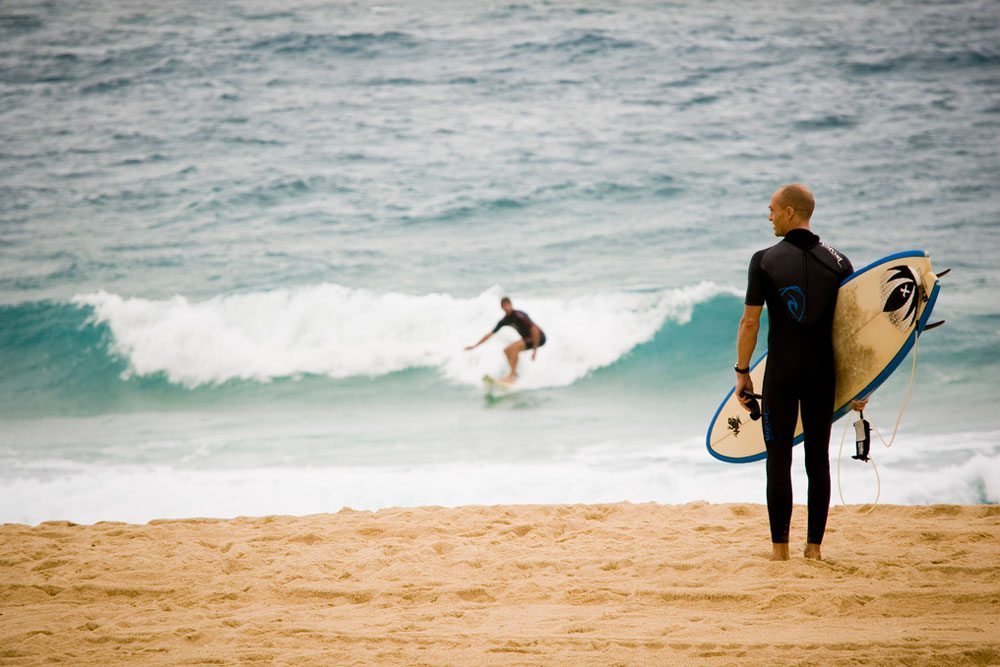
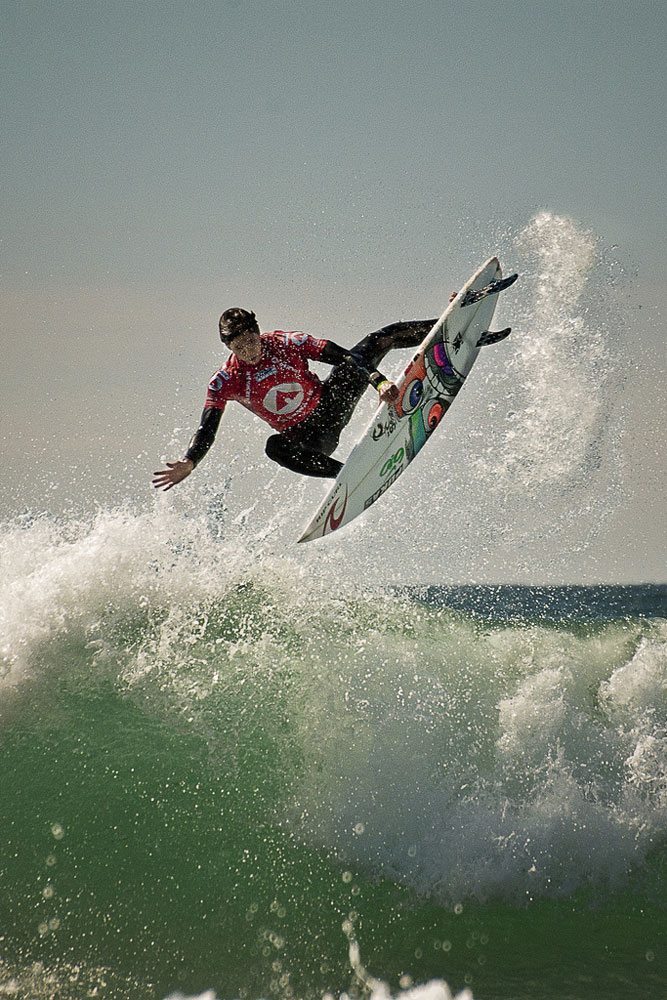
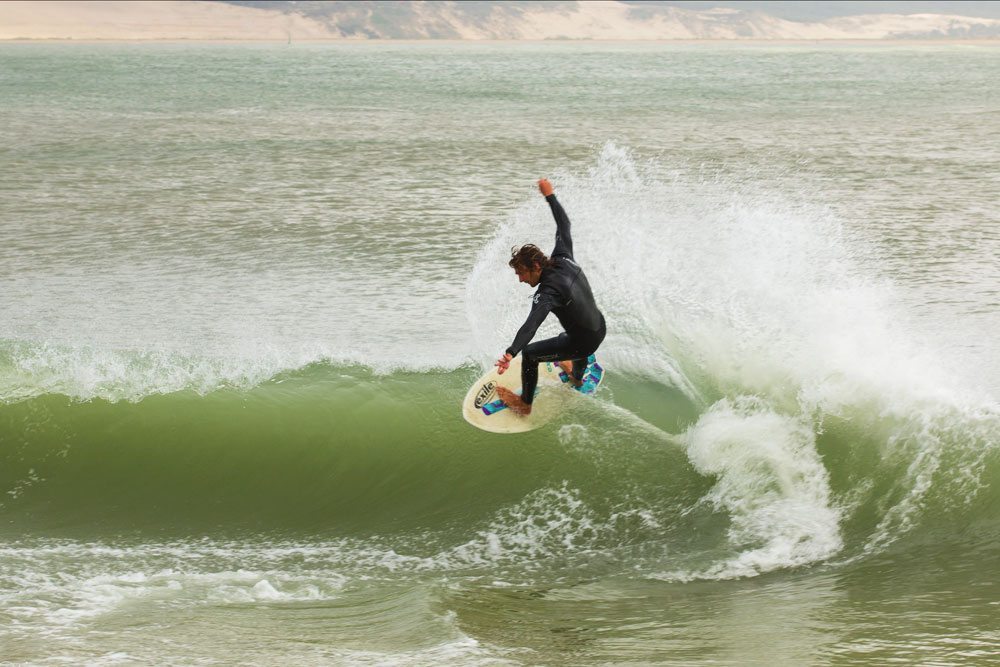
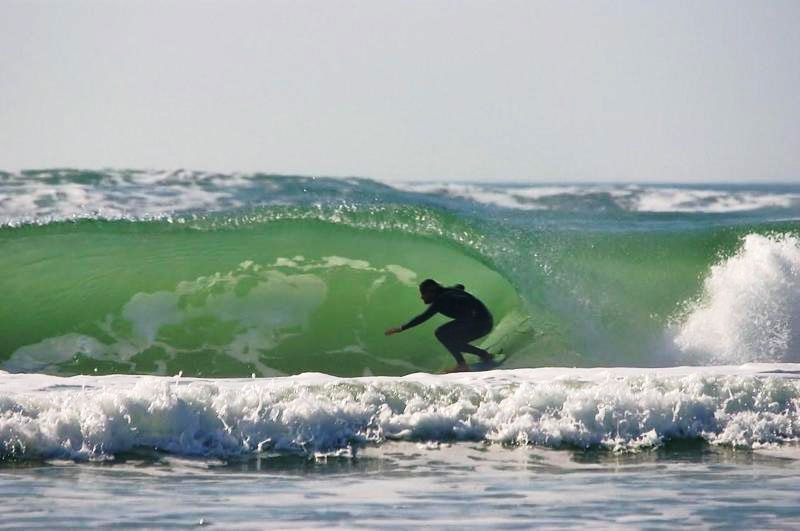
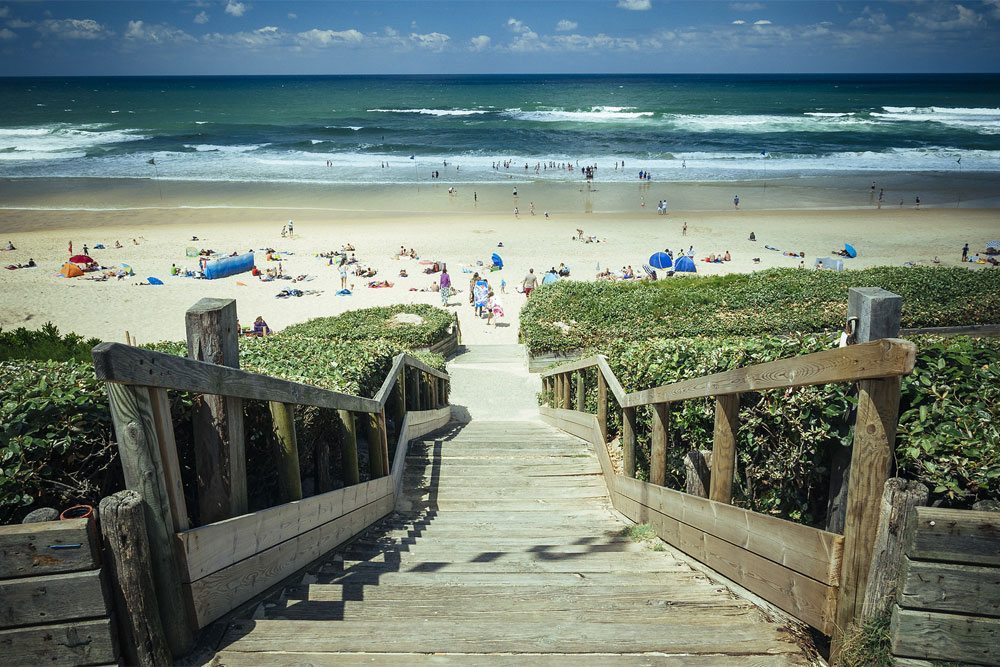
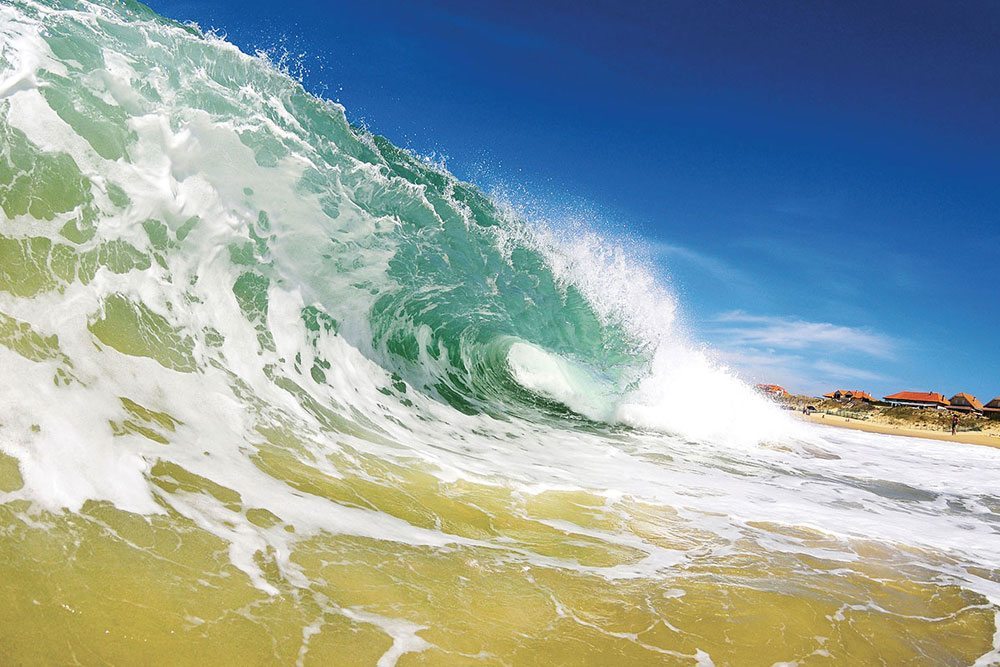
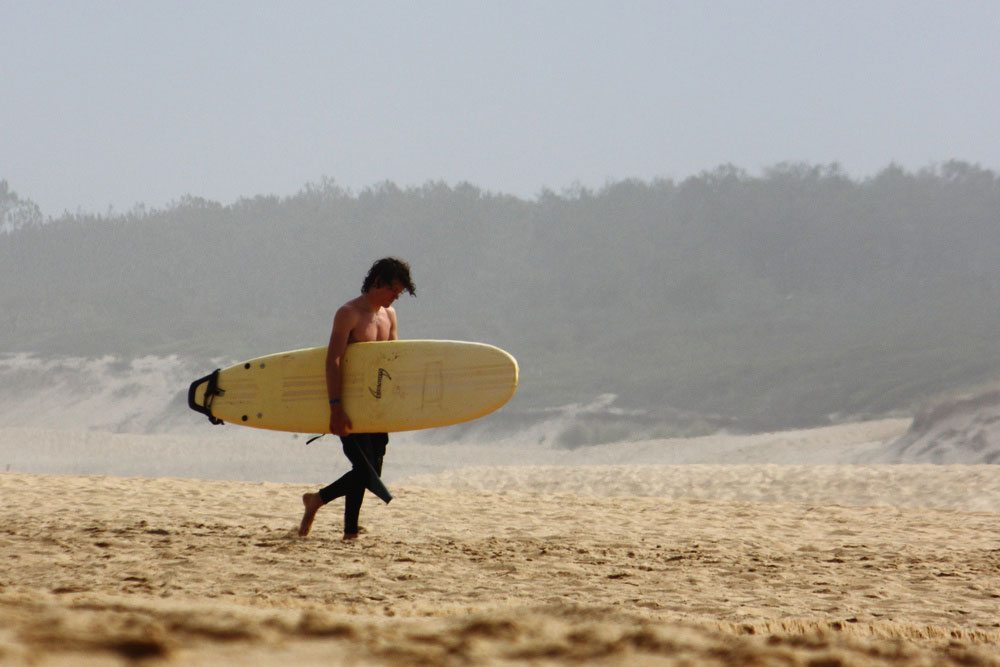
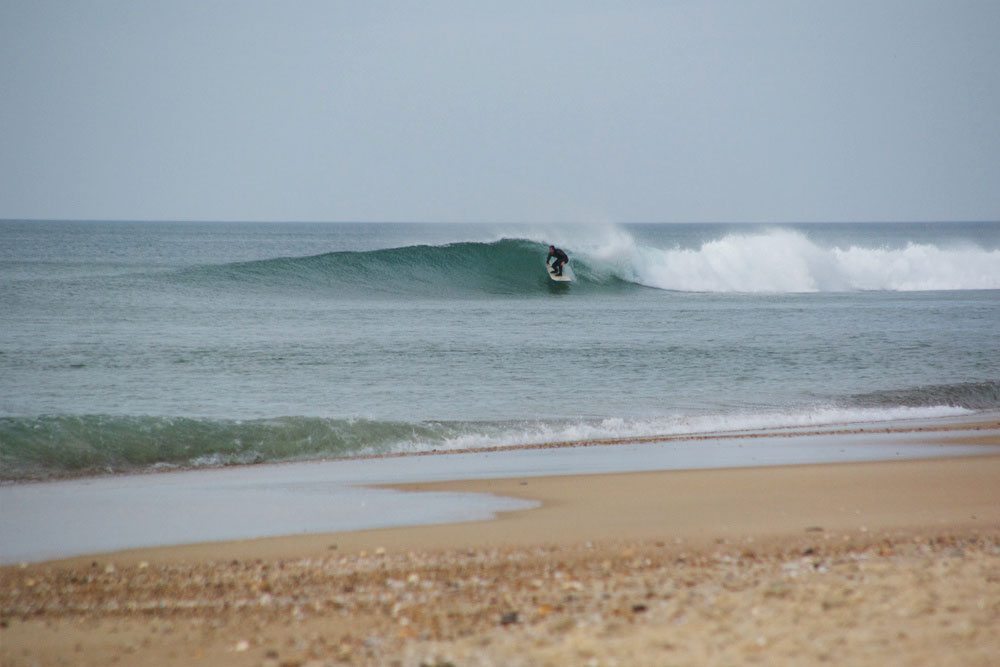

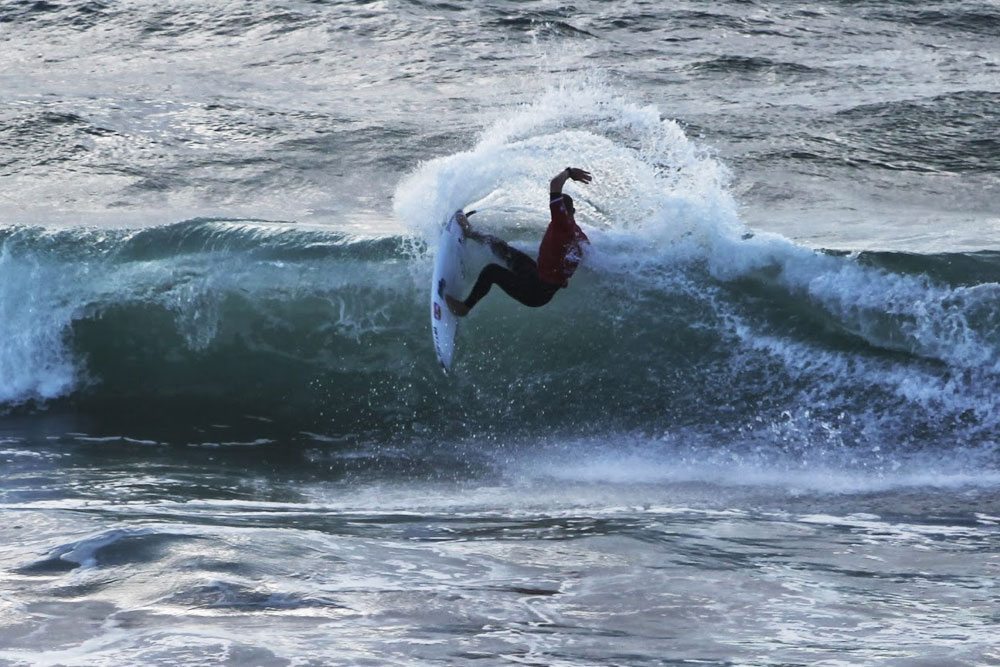
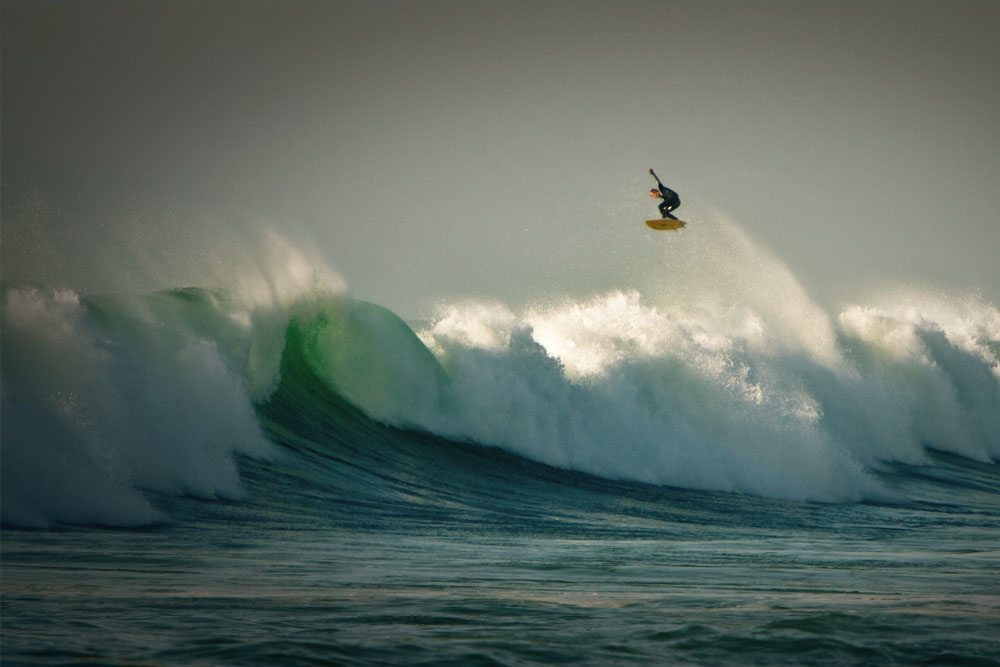
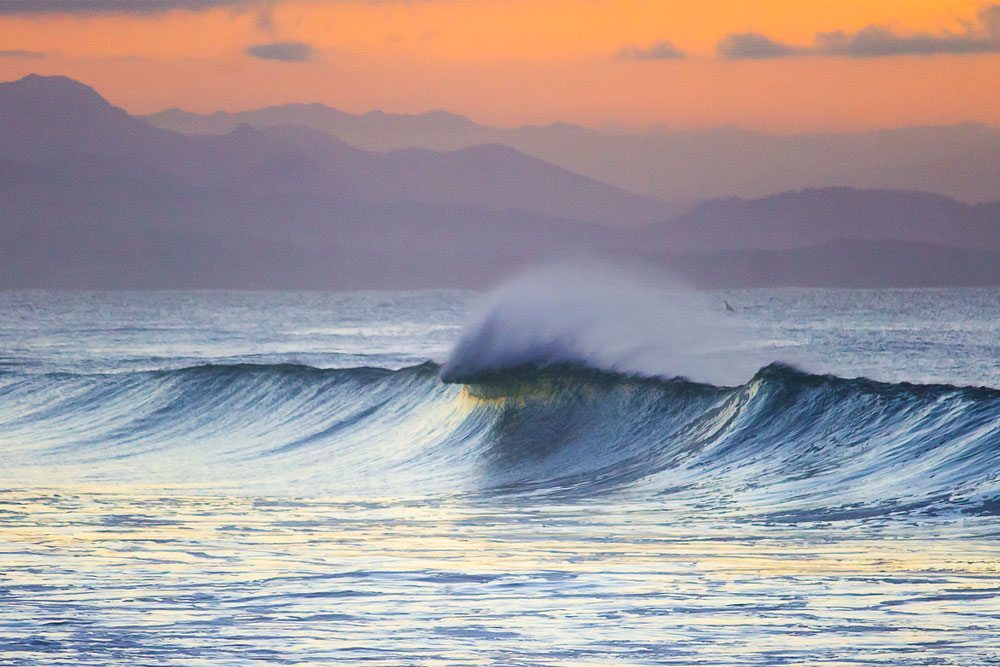
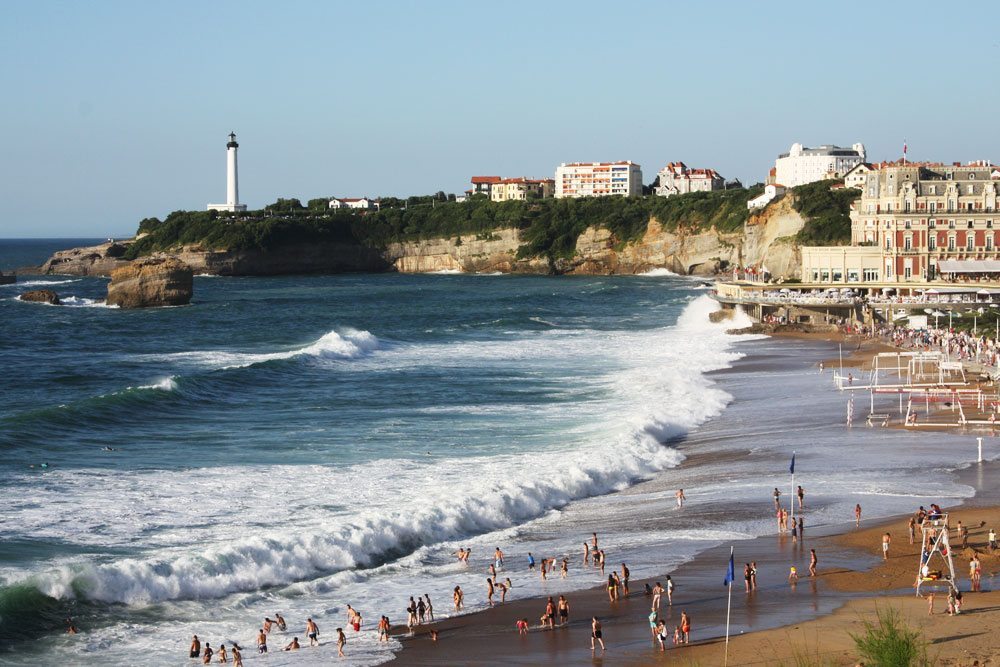
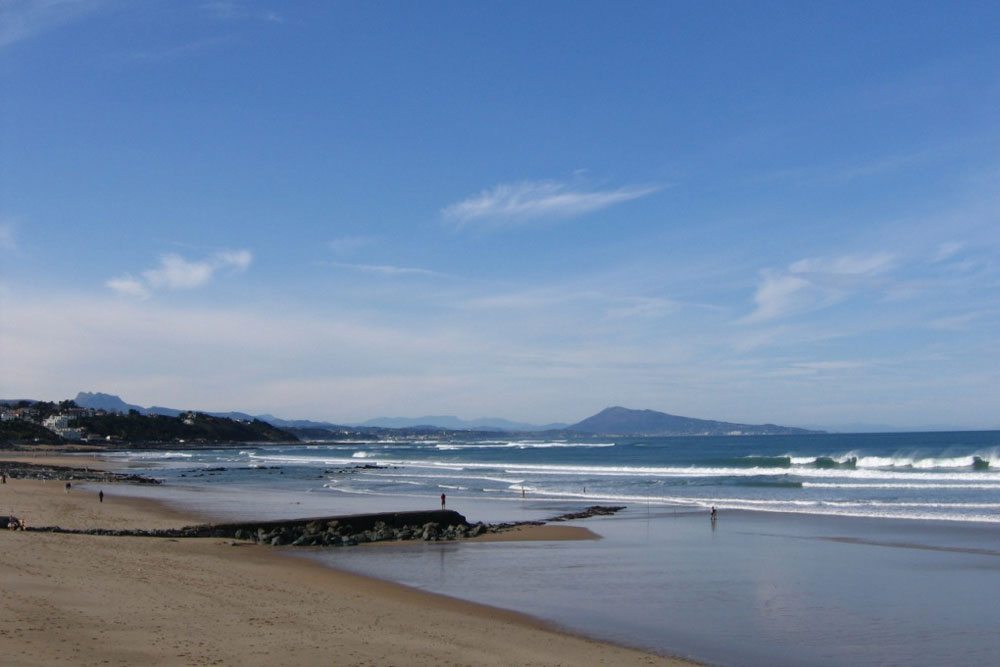
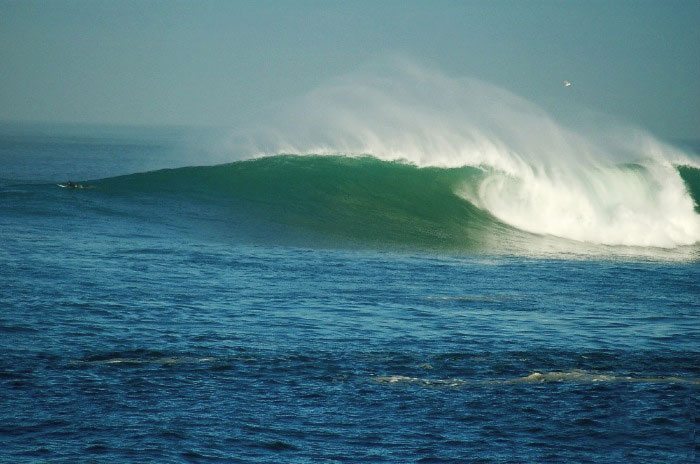
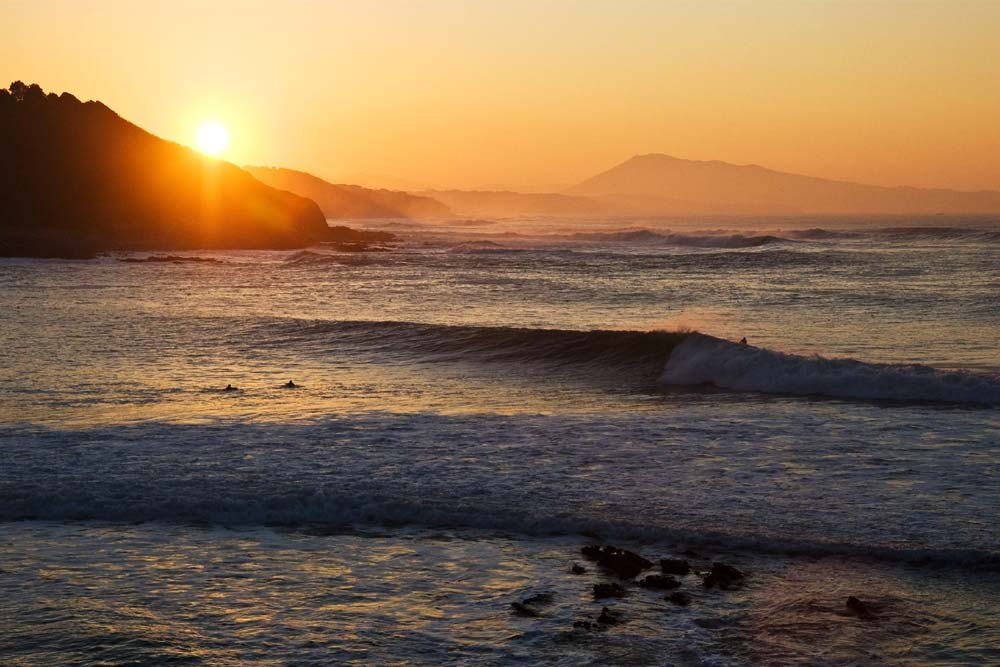
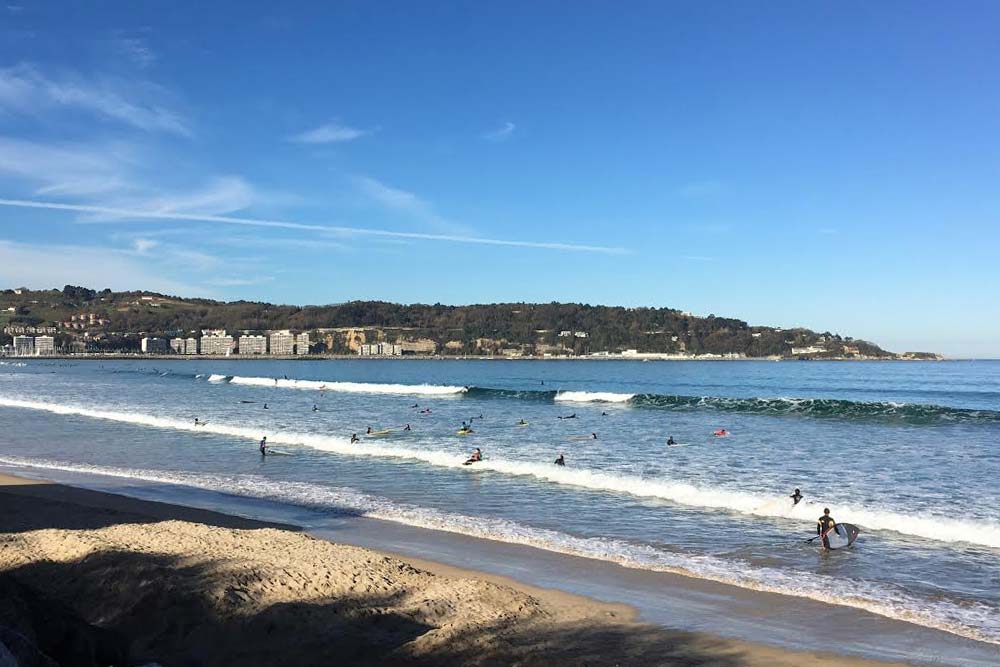
[…] Surfing in South West France • Ultimate France – https://www.ultimatefrance.com/surfing/south-west-france […]
My bad just found them, but a webcam would be good.
Good afternoon,
Didn’t bring the board this trip, but will certainly be back to try out your breaks.
Perhaps some videos of the various surf spots would be excellent.
May I suggest you contact Surfline and set up a webcam, you may even get some advertising revenue.
Best regards,
Matthew Orr
[…] South West France […]